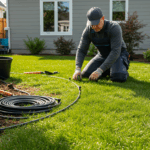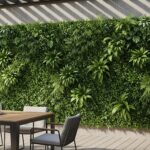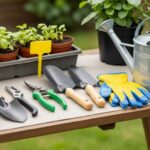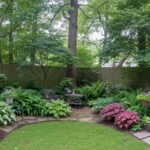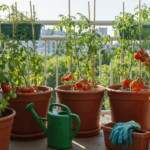Unveiling the Beauty and Benefits of Home Gardening
Have you ever paused to wonder at the therapeutic and aesthetic power a simple home garden holds? Beyond the beauty, a garden can transform not only physical spaces but also mental landscapes, offering a sanctuary from the bustling modern life. The trend of home gardening is burgeoning, as more individuals discover its myriad benefits, from fostering environmental sustainability to promoting physical well-being. The allure lies in its accessibility; with a few tools and some guidance, even beginners can cultivate lush oases, no matter the size of the garden. This article will serve as a comprehensive guide for those embarking on their gardening journey, providing insights tailored to novices in need of a gentle yet informative introduction to the world of home gardening.
Understanding the Basics of Home Gardening
Before diving into the hands-on aspects of gardening, it is essential to grasp the foundational principles. Successful gardens are built on understanding plant science, climate conditions, and soil composition. These basics are vital in determining suitable plant choices, ensuring healthy growth and sustainability. A gardener needs to consider factors such as sunlight exposure, watering needs, and plant selection appropriateness for their specific region. This knowledge not only aids in the initial setup but also in maintaining the vitality of the garden over time.
| Component | Importance | Considerations |
|---|---|---|
| Soil | Provides nutrients | Check pH and composition |
| Sunlight | Supports photosynthesis | Evaluate light exposure |
| Water | Essential for growth | Understand watering needs |
| Climate | Influences growth patterns | Regional suitability |
Succeeding in home gardening requires balancing these elements to create an optimal environment for plants to thrive.
Choosing the Right Plants for Your Garden
The selection of plants plays a pivotal role in the success of a home garden. For beginners, it is advisable to start with easy-to-grow species that are well-suited to their local climate and soil conditions. Consideration should be given to the garden’s purpose—whether for ornamental beauty, culinary delights, or biodiversity benefits. Research and understanding native and adaptive plants will likely lead to more robust growth and reduced maintenance. Such an informed approach not only enhances one’s gardening experience but also conserves valuable resources, minimizing the ecological footprint.
“To plant a garden is to believe in tomorrow.” — Audrey Hepburn
Essential Tools and Equipment for Beginners
A successful gardener’s arsenal is incomplete without the essential tools and equipment to facilitate the work. Recognizing which tools are necessary versus advantageous helps beginners invest wisely. Common necessities include a spade, watering can, pruning shears, and gloves. As one’s gardening skills evolve, additional tools like a garden fork or hoe may become beneficial. Understanding each tool’s function and proper use ensures efficiency and safety, paving the way to a thriving gardening practice without overwhelming the novice gardener.
Planting Techniques and Best Practices
Effective planting techniques are vital for a thriving garden. Understanding how to plant properly can minimize transplant shock and encourage healthy root development. Key practices include adequate spacing, proper depth, and timely watering post-planting. For seeds, attention to sowing depth and initial watering can make the difference between success and failure. Beginners should embrace methods such as companion planting to optimize space and deter pests, presenting an opportunity to naturally boost garden productivity.
Maintaining Your Home Garden
Plant maintenance is an ongoing commitment that underpins the success of any garden. Regular tasks such as watering, weeding, and mulching form the cornerstone of a maintenance routine. Establishing a schedule can help novice gardeners instill discipline and habit in these activities. Additionally, keen observation of plant health signals, such as discoloration or wilting, allows for prompt intervention, protecting the garden’s vitality. Through consistent care and attention, a garden can flourish, rewarding its caretaker with both beauty and abundance.
Dealing with Pests and Diseases
Pests and diseases are inevitable challenges in gardening. However, understanding eco-friendly approaches can aid in their management. Identifying common pests and their life cycles enables proactive prevention, reducing dependency on chemicals and fostering biodiversity. Techniques such as crop rotation, natural predators, and organic pesticides present viable solutions for addressing these challenges sustainably. The conscious management of garden health ensures a safe and flourishing environment for both plants and humans.
The Emotional and Health Benefits of Gardening
Gardening is not merely a physical activity but also a balm for mental well-being. Scientific studies support the idea that engaging with nature promotes relaxation and reduces stress levels. For beginners, the experience of nurturing plants from seed to bloom can offer profound satisfaction and a sense of achievement. The physical activity associated with gardening, characterized by stretching, bending, and lifting tasks, enhances physical fitness and overall health. Thus, gardening is a holistic endeavor that nurtures the body, mind, and spirit.
FAQ – Dúvidas Comuns
How do I start a home garden from scratch?
Begin by assessing your space, researching regional plant choices, and preparing your soil. Start small to manage effectively.
Which plants are best suited for beginners?
Opt for hardy plants like tomatoes, basil, and marigolds, which adapt easily and require minimal care.
How often should I water my plants?
Watering frequency depends on the plant type and climate. Generally, water when the topsoil feels dry to the touch.
What should I do if my plants get sick?
First, identify the issue. Use organic solutions such as neem oil or insecticidal soap to address common pests or diseases.
Can gardening be done in small spaces?
Absolutely. Container gardening, vertical gardens, and window boxes are excellent options for limited spaces.
Conclusion
Embarking on a home gardening journey can be deeply rewarding, transforming not just spaces but lives. As beginners cultivate their gardens, they embark on a path of constant learning and growth, both literally and metaphorically. This guide has sought to equip novice gardeners with the foundational knowledge and inspiration to start their horticultural adventure. As hands sink into the earth and plants begin to flourish, gardeners will find themselves nourishing more than just plants—they will cultivate patience, resilience, and a profound connection to the natural world. With time and dedication, a garden can bloom into a personal paradise, offering endless possibilities and profound peace.
Meta Descrição: Discover the ins and outs of home gardening for beginners in this comprehensive guide. Learn basics, best practices, and enjoy the numerous benefits of gardening.


